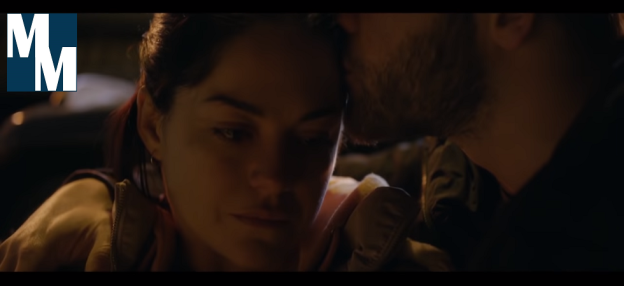Through a focused plot and character portrayals, Roddy Doyle’s newest movie highlights the flashpoints and pitfalls of Ireland’s housing crisis.
Dear Eoghan,
How’s it going? I’m writing to take a break from the usual political screeds and bring you to the movies. Well, almost. The movie we’ll be discussing today is Roddy Doyle’s latest, Rosie. It’s a movie which, although imperfect, has a flawless plotline which navigates any viewer through the heartbreak and distress of the housing crisis. Last week we scrutinised the average Dublin couple. With this movie, we are compelled to look at the fringes.
Sadly, the majority of my cinema-going the past few years has consisted of superhero movies with copious amounts of popcorn. I can count on one hand the amount of Marvel movies I haven’t seen on the big screen. Throw in a smattering of sci-fi and horror movies and you’ve got the perfect route to escapism. Of what else does the magic of the silver screen consist, if not a chance to get rid of reality and soak up some ridiculous fun? Bag of Malteasers optional.

Sometimes, however, M persuades me to see something more high-brow, and for this I am sincerely grateful. In these situations, I’ll forego the popcorn and escapism to get my teeth into something with more artifice, or social commentary. Even with M away (hustling in China this time), I didn’t need to be persuaded to see Rosie. It was a movie which I expected to inform me, but not to move me to such empathy and self-doubt.
This is a movie you can’t escape. Rather than being set in a Manhattan skyscraper or a faraway galaxy constructed of CGI, this is a kitchen-sink Dublin movie, replete with the bell of the LUAS and the damp clouds hanging over housing estates. It covers, almost exclusively, a single day in the life of a family of six who are stuck between the cracks of Dublin’s housing crisis. Rosie and her husband are perennially in search of a home – or at the very least, a hotel room to spend the night in – while also dealing with the everyday issues of family life, which are made infinitely worse by the strained living situation. The image of Rosie, phone wedged between her ear and shoulder as she straps her infant daughter into the back seat of the car outside her kids’ school, trying to secure a hotel room for a couple of nights, is a telling one.
If the movie was designed to point out the flashpoints and pitfalls of the housing crisis, then it did so to great effect through scenes like this – and especially through its dialogue.
At one point, Rosie (played to perfection by Sarah Greene) is talking to her partner after getting off the phone to “the emergency number”. Nothing is available tonight, although the emergency staff might be able to help her if she’s a rough sleeper. “We’re not rough,” Rosie says as she reports the conversation back to her husband. “There’s nothing rough about us.”
And she’s right. The true genius of this movie is to show a family who are stoic, hard-working and loving. Rosie and partner John-Paul (Moe Dunford) lead a family who are neither foul-mouthed nor dysfunctional. The very worst behaviour parents and kids display is to have a food fight in their car.
Admittedly, this is family is fictional, but it undoubtedly represents many of the thousands of families who have found themselves in this terrible trap. Families like this bump the free-market capitalist belief most of us hold: that the homeless and disadvantaged somehow deserve their lot in life. They’re slackers, they’re uncouth, or they’ve had too many kids. Well, no – they’re not all like that. Most have been slammed to the bottom of the ladder by incomprehensible market forces which even you, the responsible minister, cannot get a grip on.
Which leads to another telling scene in the movie. After the family revisit the home they once lived in, we find Rosie trying to pry her kids away from the front porch fittings and the trampoline out the back garden. This is the only home these kids have known, but obviously they can’t stay here. Try explaining that to them, though.
“Mr. Gaffney sold the house,” Rosie says pathetically to her young daughter, hanging for dear life to the front porch. “Do you remember Mr. Gaffney, the landlord?”
“But WHY can’t we stay here?” the girl asks.
She answers with a parental non sequitur: “We just can’t.”
What more can you say to a five-year-old child? Sit them down and lecture her on free market forces? Rosie doesn’t have time for that – and anyway she doesn’t understand the situation herself.
The movie also puts into stark relief the thin film of circumstance that lies between these families and absolute depravity. There are some moments when it seems the family will slip right through this veneer at any moment. All it takes for that car to break down, or her kids to be reported to social security, and you just know that’s it. If Rosie isn’t seconds away from completely losing it because of one missed hotel room, then the audience is; it’s a miracle that she and John Paul don’t resort to screaming at the kids or each other when they can’t find a home for their family, such is the desperation that is tenable in their every phone call and conversation.
Rosie’s thirteen-year-old daughter represents this tenuous grip superbly. She is a studious and quiet girl, yet she’s already starting to rebel against her family’s poverty; she would do almost anything to avoid another night in a hotel room – or worse, the family car. In her, it’s easy to see thousands of young women who fall into prostitution and addiction just to escape the poverty their parents can’t lift them out of.
“We’ll find somewhere,” says John-Paul as their options for the night are running out.
Rosie looks up at him and asks plaintively: “But where?”
John-Paul has been ducking out of his minimum-wage job today to look for a home – any home – that they can move into. He visits a house on the East Wall, and is soon politely pushing past couples with trendy glasses and neat haircuts.
At some point in this movie, any thoughtful viewer will see themselves, and they will see the difference between themselves and a person who is truly living on the edge. For me it was this moment. I am one of those yuppies crowding the house. I can’t see the man passing me on the staircase as he sizes the place up as a home for his family. I am just obsessed with my own sorry position in this mess. I am contemplating the bathroom tiles. I am standing beside the well-groomed estate agent as she condescends to the eager father, asking if this really is the kind of place for a family?
After the movie I passed a homeless man on the Rathmines Road. I gave him a couple of quid because – well, but for the grace of God I would be there myself. I couldn’t talk to him. I wanted to but I was full of shame. I was magnanimously handing over a couple of grubby coins and I was disgusted with myself as a human being. How could I hold a conversation about the weather with a man who just happened to be born in a slightly less lucky position than me, and had been led by circumstance to the squalor and dirt of a life lived on the street, while I was led to a path of relative comfort? I got on the bus back to my upmarket one-bedroom flat.
But for the grace of God, Eoghan. Some stint of my birth and yours means we only have to watch this kind of desolation on a cinema screen or pass it on the street – or, once more removed, see it subsumed and condensed in a report from the Department of Social Welfare.
How far removed are you, Eoghan? Can you count the ways, the degrees to which you are disconnected from those who you represent? Discount the photo ops with newly-homed families and the mandatory meetings with your constituents; now calculate the number of struggling citizens you have spent time with and understood. Weigh them up against your colleagues,your UCD alumni and your neighbours on Ailesbury Road. The balance, I’m sure, is lacking.
More of which next week. For now, take the night off, stroll down to your local multiplex and watch Rosie. Soul-searching optional.
All the best, minister,
Simon
Main image via YouTube


















